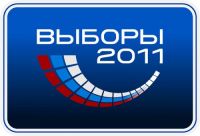Elections and Civic Control
Alexey Zakharov gave a talk on “2011 Russian legislative elections: fraud and civic control”.
On February, 16th, 2012, Alexey Zakharov, Senior Research fellow at the Laboratory for Comparative Social Research gave a talk on “2011 Russian Legislative Elections: Fraud and Civic Control”.
 The main goals of his presentation were the following:
The main goals of his presentation were the following:
- A randomized field experiment measuring the efficiency of volunteer election observers at preventing election fraud;
- An attempt to give a sociological profile of a volunteer election observer in 2011s Russia.
First, Alexei emphasized that the total fraud is estimated to be 11% of registered voters in the country and 18% of total vote case. Then he showed the results of some election polls and briefly characterized Russian political and election systems. In Moscow there were 7200000 voters, 2272 voting precincts and 120 voting territories.
Furthermore, Alexei demonstrated that turnout is positively correlated with ER support (with the example of Moscow and Samara) and is not (or even negatively correlated) with the support of other parties. Then he showed the well-known Churov distribution.
To the most typical violations at polling stations refer restrictions on movement and removal. Alexei also gave examples of specific cases of violations.
In the second part of his presentation Alexei characterized the “Civic Observer” project focusing on beginning, recruitment and organization. The usual observer objectives include the following: gathering evidence to challenge results in court and for publicity, obtain a copy of protocol and prevent fraud (if possible). Around 530 volunteers took part in the project. 430 were actually present at the stations and 327 were not ejected during voting or voting count. Around two third of the volunteers were male and the majority had higher education. 76.1 % were first-timers. The median age was 34 (min. 18 year, max. 84 years).
Alexei clarified the methodology of choosing the stations. A total of 169 stations were selected whereas observers were present at 155. After the elections the stations were divided into “clean” (without major violations, 77 stations), “dirty” (observers did not manage to prevent the election fraud, 41 stations) and “dirty” stations where no protocol was received. Alexei demonstrated election results in “clean” and “dirty” stations. ER had 24.4% at “clean” stations and 43.1% at “dirty stations (Yabloko 15% and 10.3% respectively). Alexei suggested that this huge difference could be partly explained by the fact that the fraud was moved to “dirty” stations because of the presence of observers.
Then Alexei demonstrated the difference in observers’ efficiency with the help of regression models (dependent variables – obtaining the protocol, “clean” polling station, vote for ER, turnout and individual observer ejected). In general older people tend to be less effective. The more observers are present, the easier it is to get a protocol. Being an observer (not a member of a party or mass media) increased the probability of not being ejected.
Furthermore, Alexei briefly described the volunteers for the next election of March, 4th. There are already 5041 volunteers from Moscow and 2626 volunteers from regions. 657 have already filled in the questionnaire. Alexei gave information about their gender, education, age, experience, distribution by okrug, sources of information about the project and reasons for participation. The main reasons for participations are honesty (male – 43%, female – 48%), civic position (male – 22%, female – 27%) and dissatisfaction with the government (male – 15%, female – 7%).
For the further information about the project you can see the website nabludatel.org.
Natalia Soboleva
